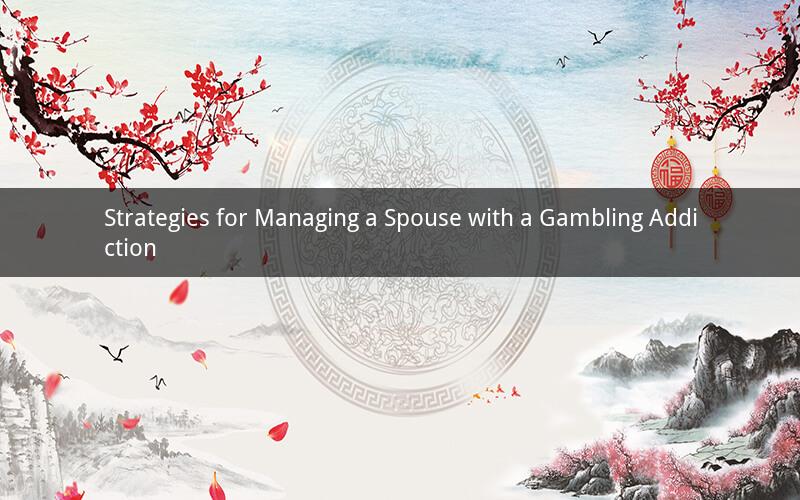
Introduction:
Gambling addiction is a serious issue that can have a profound impact on both individuals and their families. If you find yourself in a situation where your spouse has a gambling addiction, it is crucial to understand how to deal with it effectively. This article will provide you with strategies and insights on how to navigate through this challenging situation.
1. Educate Yourself about Gambling Addiction
Understanding the nature of gambling addiction is the first step in dealing with it. Research and educate yourself about the signs, symptoms, and consequences of gambling addiction. This knowledge will help you recognize the problem and take appropriate actions.
2. Seek Professional Help
It is essential to seek professional help for your spouse's gambling addiction. A therapist or counselor specializing in addiction can provide valuable guidance and support. Encourage your spouse to attend therapy sessions regularly and explore treatment options such as counseling, support groups, or rehabilitation programs.
3. Establish Boundaries and Support Systems
Setting clear boundaries is crucial in managing a spouse with a gambling addiction. Establish financial boundaries to prevent your spouse from accessing gambling funds. Additionally, surround yourself with a support system of friends, family, or support groups that can offer emotional support and encouragement.
4. Communicate Openly and Supportively
Communication is key in dealing with a spouse with a gambling addiction. Create a safe and non-judgmental environment where your spouse feels comfortable sharing their struggles. Encourage open and honest conversations, and listen actively without judgment or criticism. Support your spouse in their efforts to overcome the addiction.
5. Address Financial Consequences
Gambling addiction often leads to significant financial consequences. It is important to address these issues and develop a plan to manage the financial implications. Consider seeking the assistance of a financial advisor or therapist specializing in addiction and financial issues. Work together to create a budget, prioritize debts, and develop strategies to regain financial stability.
6. Encourage Self-Care and Coping Mechanisms
Encourage your spouse to engage in self-care activities that promote mental and emotional well-being. Encourage them to develop healthy coping mechanisms such as exercise, hobbies, or mindfulness practices. These activities can help alleviate stress and reduce the urge to gamble.
7. Practice Patience and Understanding
Dealing with a spouse with a gambling addiction is a long-term process that requires patience and understanding. Understand that recovery is a gradual process, and setbacks may occur. Avoid becoming frustrated or disappointed when progress seems slow. Instead, focus on celebrating small victories and maintaining a supportive presence throughout the journey.
8. Take Care of Yourself
It is crucial to prioritize your own well-being while supporting your spouse. Seek support for yourself through counseling or support groups specifically designed for partners of individuals with gambling addiction. Take time for self-care activities that help you maintain your mental and emotional health.
9. Encourage Family Involvement
Involving family members in the recovery process can provide additional support and understanding. Encourage your spouse to attend family therapy sessions or support groups that focus on addiction. Family involvement can help create a supportive environment and promote healing for everyone involved.
10. Be Prepared for Relapse
Relapse is a common occurrence in the recovery process. Be prepared for setbacks and understand that relapse does not signify failure. Encourage your spouse to seek help immediately if a relapse occurs and continue to provide unwavering support.
Questions and Answers:
1. How can I help my spouse recognize they have a gambling addiction?
Encourage your spouse to reflect on their gambling behavior, including the frequency, intensity, and consequences. Provide examples of how their gambling affects you and the family. Support them in seeking professional help for an accurate assessment.
2. What can I do if my spouse refuses to seek help?
If your spouse refuses to seek help, continue to offer support and express your concerns. Consider seeking guidance from a therapist or counselor who can provide strategies for dealing with resistance. Remember, you cannot force someone to seek help, but you can provide a supportive environment.
3. How can I protect myself financially from my spouse's gambling addiction?
Establish clear financial boundaries, such as separating accounts or limiting access to gambling funds. Create a budget to address financial obligations and seek professional assistance if necessary. Remember, protecting yourself financially is crucial for your own well-being.
4. Can I recover from the emotional impact of my spouse's gambling addiction?
Yes, it is possible to recover from the emotional impact of your spouse's gambling addiction. Seek support through counseling or support groups specifically designed for partners of individuals with gambling addiction. Surround yourself with a supportive network of friends and family who understand your situation.
5. How can I maintain a healthy relationship with my spouse during their recovery process?
Maintain open and honest communication, express your love and support, and encourage your spouse to seek help. Focus on positive reinforcement and celebrate small victories. Remember, recovery is a journey, and patience and understanding are key to maintaining a healthy relationship.